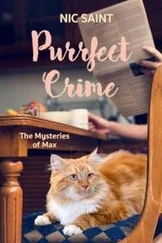Peter Abrahams - A Perfect Crime
Здесь есть возможность читать онлайн «Peter Abrahams - A Perfect Crime» весь текст электронной книги совершенно бесплатно (целиком полную версию без сокращений). В некоторых случаях можно слушать аудио, скачать через торрент в формате fb2 и присутствует краткое содержание. Жанр: Триллер, на английском языке. Описание произведения, (предисловие) а так же отзывы посетителей доступны на портале библиотеки ЛибКат.
- Название:A Perfect Crime
- Автор:
- Жанр:
- Год:неизвестен
- ISBN:нет данных
- Рейтинг книги:4 / 5. Голосов: 1
-
Избранное:Добавить в избранное
- Отзывы:
-
Ваша оценка:
- 80
- 1
- 2
- 3
- 4
- 5
A Perfect Crime: краткое содержание, описание и аннотация
Предлагаем к чтению аннотацию, описание, краткое содержание или предисловие (зависит от того, что написал сам автор книги «A Perfect Crime»). Если вы не нашли необходимую информацию о книге — напишите в комментариях, мы постараемся отыскать её.
A Perfect Crime — читать онлайн бесплатно полную книгу (весь текст) целиком
Ниже представлен текст книги, разбитый по страницам. Система сохранения места последней прочитанной страницы, позволяет с удобством читать онлайн бесплатно книгу «A Perfect Crime», без необходимости каждый раз заново искать на чём Вы остановились. Поставьте закладку, и сможете в любой момент перейти на страницу, на которой закончили чтение.
Интервал:
Закладка:
Right away she thought of Swift’s Marriage Service from His Chamber Window: Let none but Him who rules the thunder. She remembered exactly how Anne had looked reciting it at Huitres, her face flushed from wine, tennis, emotion. Wonderful wine, Roger. I’ll know something to order from now on. From Swift it was a quick jump to Gulliver’s Travels, from there to the Brobdingnagians, and there she was, up against two-stories-tall Anne, watching through the windows.
Are you mad at me?
Why would I be mad at you?
The way I played. Will you ever forgive me?
And: You’re like a lion-strong, proud, loyal. Francie sat in the pew, hearing nothing, but no longer seeing nothing; she was staring at the coffin, couldn’t take her eyes off it. She almost didn’t feel Roger poking her arm, then jerked her head up and saw the reverend beckoning her from behind the lectern.
The next thing Francie knew she was the one standing behind it, overlooking the coffin, the eyes of the mourners all on her. I have no right to be here, less right than anyone. That was the truth, the honest beginning, but whom would it serve? Watching eyes and waiting faces. No impatience. They, all of them, had time in common. Faces: the gray-haired man’s, same cheekbones, same chin, Anne’s father; Em’s, the face of the girl on the skateboard-and Francie suddenly understood what made oh garden, my garden work, the tension between the carefree girl and those tumescent grapes, just beginning to rot; Ned’s, almost as white as the reverend’s collar, except for two spots growing redder on his cheeks. And there was Savard standing at the back. She suddenly wanted to cry out: Let none but Him who rules the thunder. But did not, had nothing prepared; remembered Savard’s little nod, started talking.
“I played the best tennis of my life with Anne. It’s just a game, I know. But that’s what Anne was like. She brought out the best in everyone. There was something about her, I don’t know what it was, not to put in words. But I’m going to be thinking about it for a long time. About her. Even in death she’ll still have that power, you see. To bring out the best, at least in me, I hope to God.”
And what voice was this? Hers, of course, but strange in her ear-unmodulated, unmediated, undirected. Her inner voice. Had she ever heard it aloud before? Yes, once before: out on the ice with Ned, when she’d told him, “Maybe we’d better call this off.”
Was there more to say? Just one thing, and Francie said it: “I’m going to miss her.”
Then she was sitting beside Roger again, not knowing quite how she got there, left with three memories: Em crying; Nora squeezing her hand from her seat by the aisle; another little nod from Savard at the back, perhaps nodding to himself, not meant for her at all.
“Well done,” said Roger.
At the graveyard: fewer people, a hole in the frozen ground, more talk. All familiar: she was in the art business, knew something of funerals. Coffin lowered, symbolic shovelful of dirt thrown in, ancient wordless method for getting the message across, and it did, sounding a wintry rattle on the coffin lid that made Francie flinch. She didn’t believe in an afterlife, or God, although she’d just hoped to him in her little speech. And once before, made a deal with him, this time under the ice-a deal on which she’d reneged. Francie felt the cold then, through and through. The wind caught someone’s hat, blew it between two gravestones and out of sight.
Ned, Em, and the two grandparents were standing at the gate as Francie and Roger went out. “Thank you both for coming,” Ned said.
“So sorry,” Roger said.
Anne’s father stepped forward, took Francie’s hand. “That was so beautiful, what you said. And true-everything about her, going back to when she was a little girl, came into focus for me when you spoke.” His eyes filled with tears, but he blinked them away; Francie sensed some inner strength in him that hadn’t been passed on. “Will you be coming to the house?”
“Grandpa and I are going to decorate the tree,” Em said; she held tight to his hand. “It looks so bare.” Or maybe it had been passed on after all, just skipping a generation.
“I…” Francie looked at Ned, saw that notch in his forehead above the right eye.
“Yes,” he said. “Please do. Some people are stopping in.” He turned to his mother. “You called the caterer, didn’t you, Mom?”
She nodded. “But don’t expect anything elaborate.”
“Be that as it may,” Roger said, “Francie and I wouldn’t dream of intruding at a time like this.”
“It wouldn’t be an intrusion, would it, Ned?” said Anne’s father.
“You could help with the tree,” Em said.
Roger smiled down at her. “Perhaps some other-”
“I’d be honored,” Francie said. “Why don’t you take the car home, Roger? I’ll be back later.”
Their eyes met; his were cloudy, as though film were whizzing by at high speed, just beneath the surface. “As you wish,” he said. “But don’t be too too late.”
The caterers had laid out a buffet in Ned’s dining room: salads, cold cuts, a bar. There were people Francie didn’t know, from the radio show, the B.U. psychology department, Cleveland. She poured herself a glass of red wine because she couldn’t think of a convincing reason not to, and she needed it, and went into the living room.
The corduroy chair was gone, and in its place stood the tree, Anne’s father looping a string of lights around it, Em cross-legged on the floor with a cardboard box of ornaments wrapped in tissue. Francie sat beside her.
“Mom,” Em began, choked on the word, went on, “made most of these herself.”
Francie wanted to comfort her in some way, to stroke her head, but it wasn’t her place. She unwrapped an ornament. “She was a glassblower, too?”
“Oh, yes,” said Anne’s father. “She learned at summer camp. They said she had a knack for it.”
Francie examined the decorations: delicate translucent balls, red, green, gold, and a few of all three colors at once, that changed from one to another as she turned them in her hand; tiny bells with tiny glass clappers that rang with tiny crystal peals; stained-glass saints with alien medieval faces but relaxed, modern poses; oddities, the opposites of gargoyles, she supposed-a dog with a pagoda-roof head, a bicycle with Marlon Brando faces for wheels, a smile made of two glass snakes, one red, one green, and white Chiclets; and a Tower of Pisa, with a robed figure on top. Galileo, but studying him closely, Francie saw that he held not metal balls but a bottle of champagne and a stemmed glass, perfectly formed but no more than a quarter of an inch tall. “These are great,” she said.
“Do you think so?” Em said, watching her carefully; so was Anne’s father, from a footstool on the other side of the tree.
“Oh, yes.” Better than her paintings, much, much better; of another order entirely. “Are there more?”
“Just the angel,” Em said. “It lights up from inside.”
But it wasn’t in the box.
“Maybe it’s still in the closet,” Em said. “I couldn’t reach the top shelf.”
“I’ll get it,” Francie said, rising. “What closet?”
“Upstairs,” said Em, “on the left.” She gazed down at a glass elephant in her hand, playing its saxophone trunk.
Francie climbed the stairs, opened the first door on her left. Something wrapped in red tissue lay on the top shelf. She took it down, removed the tissue, saw a shining black angel with spun-glass wings and a face that reminded her of Miles Davis. Anne, in death, kept growing in her mind.
Turning to go downstairs, Francie saw the closed door of the master bedroom. Inside hung the portrait of Ned, unless he’d taken it down. She went closer. Why hadn’t Ned shown his portrait to Savard? Perhaps he simply hadn’t wanted to bother taking it off the wall, carrying it down. Francie knocked on the door. No response. She opened it slightly, looked in. The room was unoccupied and the portrait hung in its place. Francie went in.
Читать дальшеИнтервал:
Закладка:
Похожие книги на «A Perfect Crime»
Представляем Вашему вниманию похожие книги на «A Perfect Crime» списком для выбора. Мы отобрали схожую по названию и смыслу литературу в надежде предоставить читателям больше вариантов отыскать новые, интересные, ещё непрочитанные произведения.
Обсуждение, отзывы о книге «A Perfect Crime» и просто собственные мнения читателей. Оставьте ваши комментарии, напишите, что Вы думаете о произведении, его смысле или главных героях. Укажите что конкретно понравилось, а что нет, и почему Вы так считаете.












